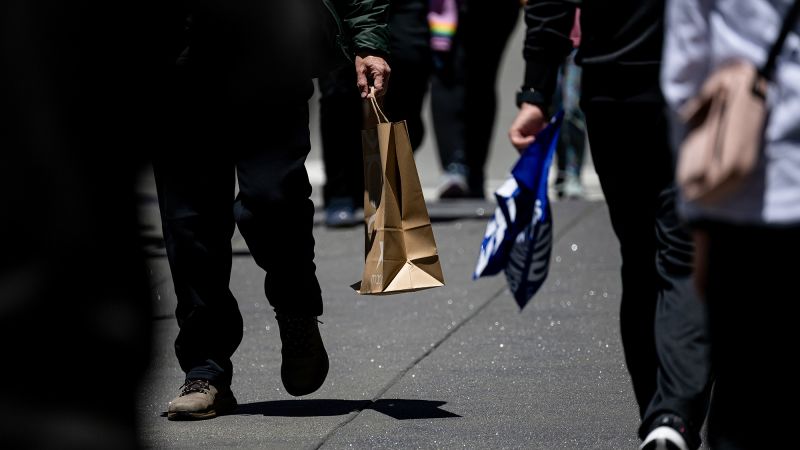After President Donald Trump initiated a tariff campaign shortly after beginning his second term, economists braced for a potential inflation crisis. Many warned that this aggressive move would lead to sharp increases in prices, directly undermining the goal of stabilizing the American economy, a goal for which millions of citizens had voted. Yet contradictory to these dire predictions, a significant inflation spike has notably failed to ensue.
The most recent data presented by the Bureau of Labor Statistics indicates that consumer prices have only risen 2.4% annually, a figure that is below economists’ anticipations and only marginally higher than the preceding month’s 2.3% rate—representing the lowest inflation levels since February 2021. More specifically, core inflation, which excludes the volatile food and gas sectors, edged down to 2.5% in April, its lowest reading since March 2021. This trend diverges from the predictions made by market analysts who anticipated significant inflationary effects due to heightened tariffs.
Currently, America’s effective tariff rate stands at 14.1%, a stark rise from just 2.3% the previous year, suggesting that Trump’s administration has raised taxes on imported goods by approximately 12 percentage points. Financial institutions such as Goldman Sachs and JPMorgan had forecasted a substantial increase in core inflation, predicting figures as high as 6.3% for the year and consumer prices soaring 3.7% by early 2026. Surveys, including those conducted by the University of Michigan, indicated that American consumers expected prices to jump by 6.6% this year, reflecting pervasive worries about the economic landscape.
However, instead of conforming to these forecasts, the economic reality has remained unexpectedly stable. This raises questions regarding the capabilities of economists to accurately predict inflation patterns, particularly as America’s economic structure is vast and intricate. Many wonder if economists will eventually be proven correct, especially as these predictions continue to linger despite current outcomes.
Notably, Fed Chair Jerome Powell has recently indicated that only a few products, such as electronics from China, are experiencing price increases attributable to tariffs. He clarified that many stores are still processing inventory received prior to the imposition of tariffs, which has affected current pricing trends. In fact, evaluations by research firms such as Telsey Advisory Group revealed insignificant price increases for a majority of consumer items tracked, with the prices of cars—even those impacted by significant tariffs—reportedly decreasing in recent months.
Despite these encouraging figures for consumers, the Trump administration has confidently proclaimed success in curtailing inflation through tariffs, as stated by Peter Navarro, the White House’s chief trade adviser. He noted that contrary to predictions, the administration has not seen inflation spike but rather the maintenance of price stability and economic growth. Nevertheless, this assertion is contested when considering the expansive scope of tariffs enacted during Trump’s second term, which amount to substantial increases in tariffs on a majority of imported goods.
Moreover, the pandemic has further clouded the economic impact of tariffs, making it difficult for economists to evaluate the real consequences of increased tariffs. While some data does indicate rising prices in sectors affected by tariffs, the general inflationary landscape remains subdued.
Joseph Lavorgna, a former economist turned Treasury official, expressed optimism concerning the current scenario where inflation has not yet surged following tariff policies. However, industry-wide sentiments are shifting, with major retailers like Walmart, Target, and Home Depot signaling forthcoming price increases due to tariff pressures. As consumer goods become more expensive, businesses now face tough decisions regarding pricing strategies and the potential for layoffs to manage costs.
Despite the current stability, many economists are wary and predict that this lull may only serve as a precursor to an unavoidable surge in prices as inventories transition to reflect recent tariff impacts. Fed Chair Powell concurs, stating that the effects of tariffs typically take time to manifest fully in consumer pricing.
In this intricate web of economic forecasting, a consensus is beginning to form around the idea that while present metrics may reflect stability, pressures are mounting that could prompt significant price hikes later in the year. Small businesses, lacking the resilience of larger competitors, face even greater challenges, necessitating strategic maneuvering as they navigate these turbulent waters. As retailers begin to exhaust their supplies of pre-tariff goods, the expectation for future price changes exacerbates anxiety within the market.
In summary, the conversation surrounding the impact of tariffs on inflation remains nuanced and multi-faceted. With a mix of optimism and caution permeating economic discussions, the coming months will likely prove crucial in revealing the long-term effects of Trump’s tariff policies.



